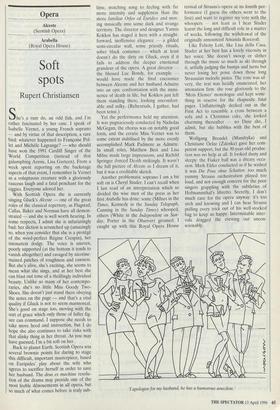Opera Alceste (Scottish Opera) Arabella (Royal Opera House)
Soft spots
Rupert Christiansen
She's a rum do, an odd fish, and I'm rather fascinated by her case. I speak of Isabelle Vernet, a young French soprano — and by virtue of that description, a rare bird: whatever happened to Francoise Pol- let and Michele Lagrange? — who should have won the 1991 Cardiff Singer of the World Competition (instead of that galumphing Aussie, Lisa Gasteen). From a week spent reporting on the backstage aspects of that event, I remember la Vernet as a voluptuous creature with a gloriously raucous laugh and a fatal penchant for the ciggies. Everyone adored her.
With Scottish Opera she is currently singing Gluck's Alceste — one of the great roles of the classical repertory, as Flagstad, Callas, Baker and Norman have all demon- strated — and she is well worth hearing. In some respects, I admit she is infuriatingly bad: her diction is scrunched up (amazingly so, when you consider that she is a protégé of the word-perfect Regine Crespin), her intonation dodgy. The voice is uneven, poorly supported (at the bottom it tends to vanish altogether) and ravaged by nicotine- stained patches of roughness and rawness. But she's alive, she's exciting, she seems to mean what she sings, and at her best she can blast out tone of a thrillingly individual beauty. Unlike so many of her contempo- raries, she's no little Miss Goody Two- Shoes. She doesn't just stand there obeying the notes on the page — and that's a vital quality if Gluck is not to seem marmoreal. She's good on stage too, moving with the sort of grace which only those of fuller fig- ure can command. I suppose she needs to take more heed and instruction, but I do hope she also continues to take risks with that slinky thing in her throat. As you may have guessed, I'm a bit soft on her.
Back to planet Earth. Scottish Opera win several brownie points for daring to stage this difficult, important masterpiece, based on Euripides' play about the wife who agrees to sacrifice herself in order to save her husband. The deus ex machina resolu- tion of the drama may provide one of the most feeble denouements in all opera, but so much of what comes before is truly sub- lime, matching song to feeling with far more intensity and suppleness than the more familiar Orfeo ed Euridice and mov- ing musically into some dark and strange territory. The director and designer Yannis Kokkos has staged it here with a straight- forward, inoffensive elegance — a gilded semi-circular wall, some priestly rituals, sober black . costumes — which at least doesn't do the dirty on Gluck, even if it fails to address the deeper emotional grandeur of the opera. A great director the blessed Luc Bondy, for example -- would have made the final encounter between Alceste and her husband Admete into an epic confrontation with the immi- nence of death in life, but Kokkos just left them standing there, looking uncomfort- able and sulky. (Rehearsals, I gather, had been tense.) Yet the performance held my attention. It was pugnaciously conducted by Nicholas McGegan, the chorus was on notably good form, and the erratic Miss Vernet was to some extent stabilised by the more evenly accomplished Mark Padmore as Admete. In small roles, Matthew Best and Lisa Milne made large impressions, and Richild Springer danced Death strikingly. It wasn't the full picture of Alceste as I dream of it, but it was a creditable sketch.
Another problematic soprano I am a bit soft on is Cheryl Studer. I can't recall when I last read of an interpretation which so divided the wise men of the press as her first Arabella has done: some (Milnes in the Times, Kennedy in the Sunday Telegraph, Canning in the Sunday Times) whooped, others (White in the Independent on Sun- day, Porter in the Observer) groaned. I caught up with this Royal Opera House revival of Strauss's opera at its fourth per- formance (I guess the others went to the first) and want to register my vote with the whoopers — not least as I hear Studer learnt the long and difficult role in a matter of weeks, following the withdrawal of the originally announced Amanda Roocroft.
Like Felicity Lott, like Lisa della Casa, Studer at her best has a lovely viscosity in her voice. She doesn't swoop or slither through the music so much as ski through it, artfully judging the bumps and turns but never losing her poise down those long Straussian melodic pistes. The tone was sil- very, the text was lucidly enunciated, her intonation firm: she rose gloriously to the `Mein Elemer' monologue and kept some- thing in reserve for the rhapsodic final pages. Unflatteringly decked out in the First Act to resemble a cross between a sofa and a Christmas cake, she looked charming thereafter --- no Duse she, I admit, but she bubbles with the best of them.
Wolfgang Brendel (Mandryka) and Christiane Oelze (Zdenka) gave her com- petent support, but the 30-year-old produc- tion was no help at all. It looked dusty and sleepy: the Fiaker ball was a dreary occa- sion. Mark Elder conducted as if he wished it was Die Frau ohne Schatten: too much yummy Strauss orchestration played too loud, and not enough concern for the poor singers grappling with the subtleties of Hofmannsthal's libretto. Secretly, I don't much care for the opera anyway: it's too arch and knowing and I can hear Strauss pulling every trick out of his well-stocked bag to keep us happy. Interminable inter- vals dragged the evening out uncon- scionably.
`I apologise for my husband, he has a humorous anecdote.'


































































 Previous page
Previous page